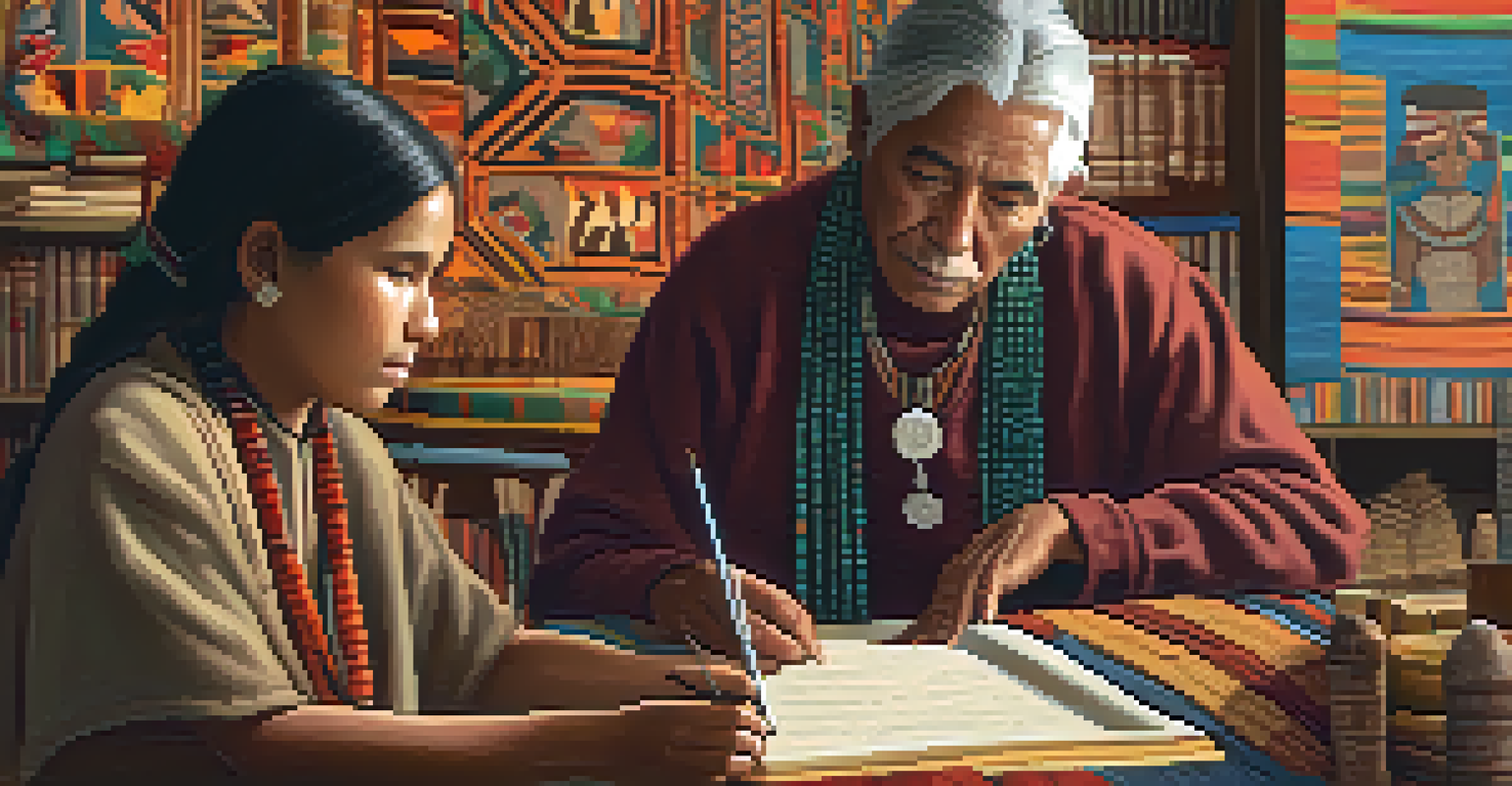Engaging with Indigenous Knowledge in Hallucinogen Research Ethics

Understanding Indigenous Knowledge in Research Contexts
Indigenous knowledge refers to the unique insights, practices, and understandings that Indigenous communities have developed over generations. This knowledge is often rooted in deep connections to the land, spirituality, and cultural traditions. In the context of hallucinogen research, it's essential to recognize that these substances may hold significant cultural meaning for many Indigenous peoples, influencing how they are perceived and used.
Indigenous knowledge is not just a body of knowledge; it is a way of being, understanding, and interacting with the world.
By engaging with Indigenous knowledge, researchers can gain a more holistic understanding of hallucinogens and their potential impacts. This approach not only honors the cultural significance of these substances but also enriches the research process itself. For instance, traditional uses of peyote in Native American rituals offer vital insights into its psychological effects and therapeutic potential.
Moreover, recognizing Indigenous knowledge can help address historical injustices where Indigenous peoples were marginalized in scientific discourse. This acknowledgment fosters mutual respect and collaboration, creating a more inclusive research environment where diverse perspectives are valued.
The Ethical Imperative of Inclusion
Incorporating Indigenous perspectives in hallucinogen research is not just about respect; it's an ethical imperative. Historically, Indigenous communities have often been exploited in research without their consent or benefit. This exploitation leads to distrust and skepticism towards scientific endeavors, which researchers must work to overcome.

Ethics in research should prioritize the voices of the communities impacted by the studied substances. By involving Indigenous peoples in the research design, implementation, and analysis, researchers can ensure that their work is aligned with the values and needs of these communities. This partnership can also help in developing ethical guidelines that reflect Indigenous worldviews.
Honoring Indigenous Knowledge
Engaging with Indigenous knowledge enriches hallucinogen research by incorporating cultural significance and holistic insights.
For example, involving Indigenous leaders in the decision-making process ensures that their cultural practices are respected and considered. This collaboration not only enhances the legitimacy of the research but also empowers Indigenous communities, allowing them to reclaim their narratives and knowledge.
Challenges in Engaging Indigenous Knowledge
While engaging with Indigenous knowledge is vital, it comes with its own set of challenges. One significant hurdle is the potential for misinterpretation or appropriation of cultural practices. Researchers must approach Indigenous knowledge with sensitivity, ensuring they do not exploit or misrepresent these traditions.
Research is not about what we can take from Indigenous communities, but what we can learn and how we can contribute to their wellbeing.
Additionally, there may be differing views within Indigenous communities about the use of hallucinogens. Some members might view these substances as sacred, while others may hold different opinions based on personal or cultural beliefs. Navigating these diverse perspectives requires patience, active listening, and a genuine desire to understand.
Furthermore, researchers may face institutional barriers that prioritize traditional scientific methodologies over Indigenous ways of knowing. Overcoming these obstacles requires a commitment to interdisciplinary approaches that value and integrate diverse knowledge systems.
Building Trust through Community Engagement
Trust is a cornerstone of effective collaboration with Indigenous communities. Building this trust involves consistent and respectful engagement over time. Researchers should strive to establish relationships that go beyond mere consultation, fostering genuine partnerships that benefit both parties.
For instance, researchers can engage in community events, share research findings in accessible formats, and involve community members in the research process. This transparency helps to demystify the research and allows communities to see its relevance to their lives, fostering a sense of ownership over the knowledge produced.
Ethics Demand Community Inclusion
Involving Indigenous communities in research design and implementation is essential to address historical exploitation and ensure ethical practices.
Additionally, acknowledging the contributions of Indigenous knowledge in research publications can further strengthen this trust. When Indigenous perspectives are highlighted and credited, it reinforces the idea that their knowledge is not only respected but is also a fundamental part of the research narrative.
Best Practices for Ethical Research
To conduct ethical research involving hallucinogens and Indigenous knowledge, researchers should adhere to best practices that prioritize respect and collaboration. First, they should engage with Indigenous communities from the outset, seeking their input in shaping research objectives and methodologies. This early involvement paves the way for more culturally relevant research.
Additionally, researchers should prioritize informed consent, ensuring that Indigenous participants fully understand the implications of their involvement in the study. This means providing information in culturally appropriate formats and languages, promoting clarity and understanding.
Finally, researchers should commit to sharing the outcomes of their work with the Indigenous communities involved. This transparency not only builds trust but also ensures that the knowledge gained benefits the communities that contributed to the research.
The Role of Education in Fostering Understanding
Education plays a crucial role in fostering a deeper understanding of Indigenous knowledge and its significance in hallucinogen research. Academic institutions can benefit from integrating Indigenous studies into their curricula, promoting awareness of diverse knowledge systems among students and researchers alike. This foundational knowledge encourages future researchers to approach Indigenous communities with respect and sensitivity.
Workshops and training sessions focused on cultural competence can also help researchers navigate complex ethical landscapes. These programs can provide insights into Indigenous ways of knowing, allowing researchers to better appreciate the perspectives and values of the communities they engage with.
Building Trust through Engagement
Establishing genuine partnerships with Indigenous communities fosters trust and allows for collaborative research that respects their knowledge.
By prioritizing education, researchers can cultivate a new generation of scientists who are not only aware of the importance of Indigenous knowledge but are also equipped to engage with it meaningfully and ethically.
Future Directions in Hallucinogen Research Ethics
Looking ahead, the integration of Indigenous knowledge into hallucinogen research ethics is more important than ever. As interest in these substances grows in both academic and therapeutic contexts, researchers have a unique opportunity to reshape the narrative around their use. By prioritizing Indigenous perspectives, they can create more nuanced and respectful frameworks for understanding.
Future research should focus on developing collaborative models that highlight the contributions of Indigenous communities. This could involve co-creating research questions, methodologies, and interpretations of findings, ensuring that Indigenous voices are front and center throughout the process.

Ultimately, the goal is to create a more equitable research landscape where Indigenous knowledge is recognized as critical to the understanding of hallucinogens. By fostering these relationships, researchers can pave the way for advancements that respect both scientific inquiry and Indigenous cultural practices.